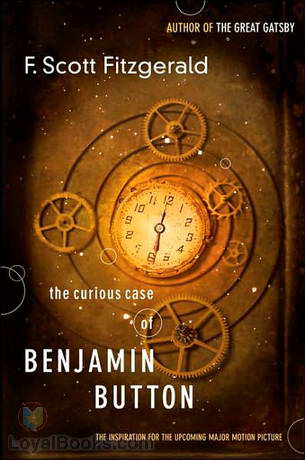
A life lived backwards, with events happening in reverse order forms the strange and unexpected framework of one of F Scott Fitzgerald’s rare short stories.
The Curious Case of Benjamin Button was published in Collier’s in 1927 and the idea came to Fitzgerald apparently from a quote of Mark Twain’s in which he regretted that the best part of life came at the beginning and the worst at the end. Fitzgerald’s concept of using this notion and turning the normal sequence of life on its head resulted in this delightful, thought provoking fantasy tale. The story was later incorporated in a Fitzgerald anthology, Tales of the Jazz Age.
The story opens with a young, high society couple who are shocked beyond belief when they discover that their much awaited first born child resembles an elderly gent of seventy, complete with a white beard and whiskers, sitting up and querulously demanding to know, “Are you my father?” Their young son is born to live out a peculiar destiny. And so begins a grotesque journey through life, with the child, Benjamin “growing down” instead of up.
Set in the Baltimore of the 1860s the story is also a satire of contemporary American society of the time. Though Fitzgerald maintains a cool and light tone throughout the story, it is in fact, deeply reflective and a very interesting take on the human condition.
For contemporary readers who are familiar with the problems of aging and “second childhood” Benjamin Button’s difficulties with dealing with the demands of his chronological age vs his mental age are extremely interesting. As we find more and more older people succumbing to Alzheimer’s disease and dementia, requiring the kind of care that an infant does, the story is strangely prophetic of the condition of geriatric care in our century. The plot is not exactly new to literature, with several stories and novels being written on a similar theme by many other writers. However, Fitzgerald’s take on growing old and how we humans deal with it is what sets The Curious Case of Benjamin Button apart.
The style is extremely readable, the premise is intriguing and refreshingly different and appeals to readers of all ages. The story was adapted into a film in 2008 and continues to fascinate Fitzgerald fans the world over.

Other Audiobook
Audiobook: Shakespeare Monologues Collection vol. 08
LibriVox readers present the eighth collection of monologues from Shakespeare’s plays. Containing 20 parts. William
Audiobook: Aristotle’s Masterpiece
Aristotle’s Masterpiece, also known as The Works of Aristotle, the Famous Philosopher, is a sex
Audiobook: God’s Troubadour, The Story of St. Francis of Assisi
Francis, a young Italian boy, is a merchant’s son who is enthralled by the troubadour
Audiobook: The House of the Wolfings
William Morris (1834-1896) was a writer, illustrator and medievalist from the Romantic period and associated
Audiobook: Short Story Collection Vol. 091
This is the 91st short story collection, with stories selected and read by Librivox readers.
Audiobook: huésped secreto
La historia de El huésped secreto se abre con una minuciosa descripción del momento previo
Audiobook: Education of Henry Adams
The Education of Henry Adams records the struggle of Bostonian Henry Adams (1838-1918), in early
Audiobook: Billy Whiskers in France
Billy Whiskers is in France, but he is homesick. Of course, he makes new friends
Audiobook: Khaki Kook Book
We cannot ignore the fact that we must eat, and that much as we dislike
Audiobook: National Geographic Magazine Vol. 09 – 01. January 1898
The National Geographic Magazine, an illustrated monthly, Vol IX, the January Number. It includes the
Audiobook: Houses of Lancaster and York with the Conquest and Loss of France
The Wars of the Roses took place during the last phase of the Hundred Years’
Audiobook: Essays, First Series
“I do not wish to treat friendships daintily but with roughest courage. When they are